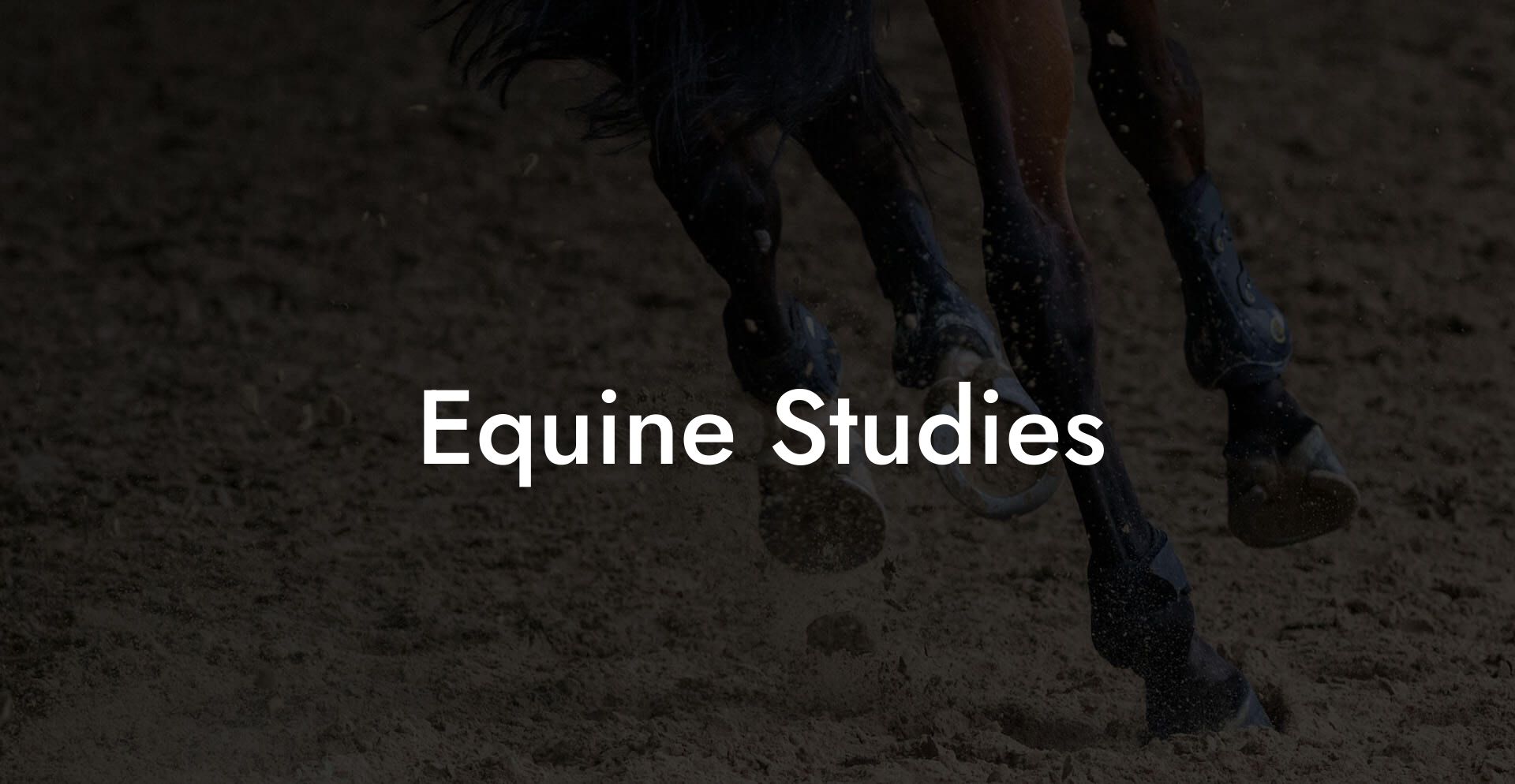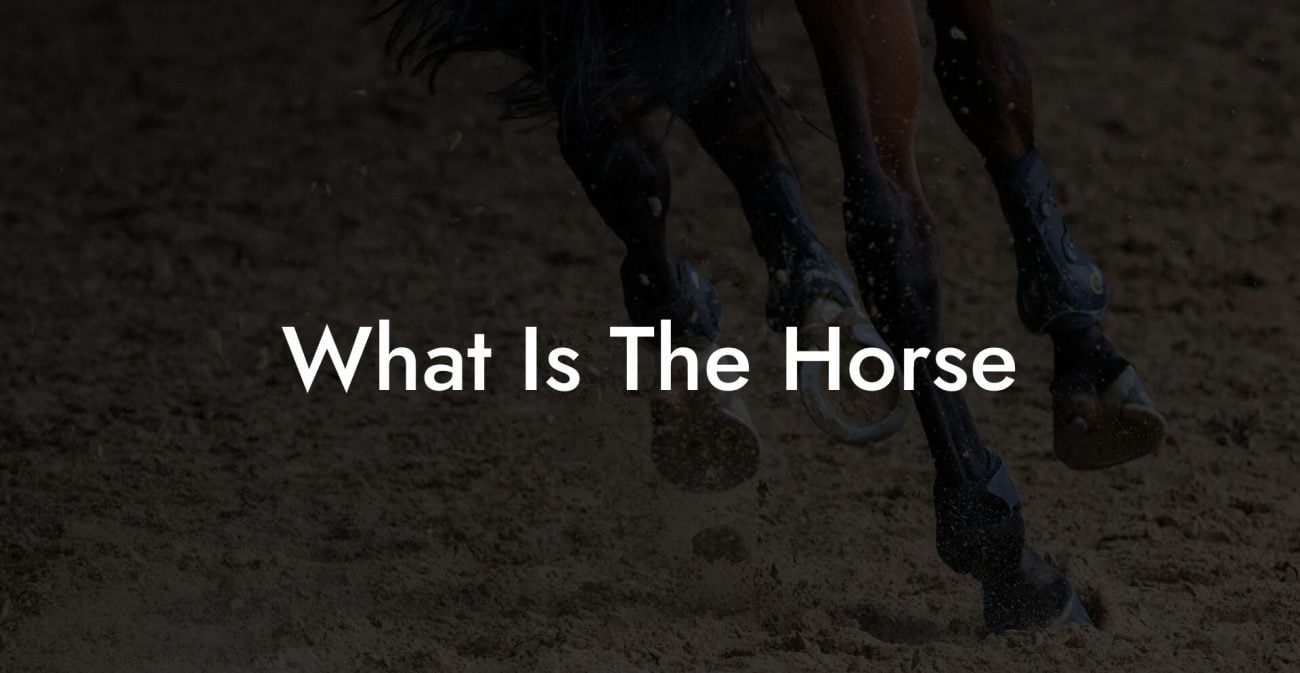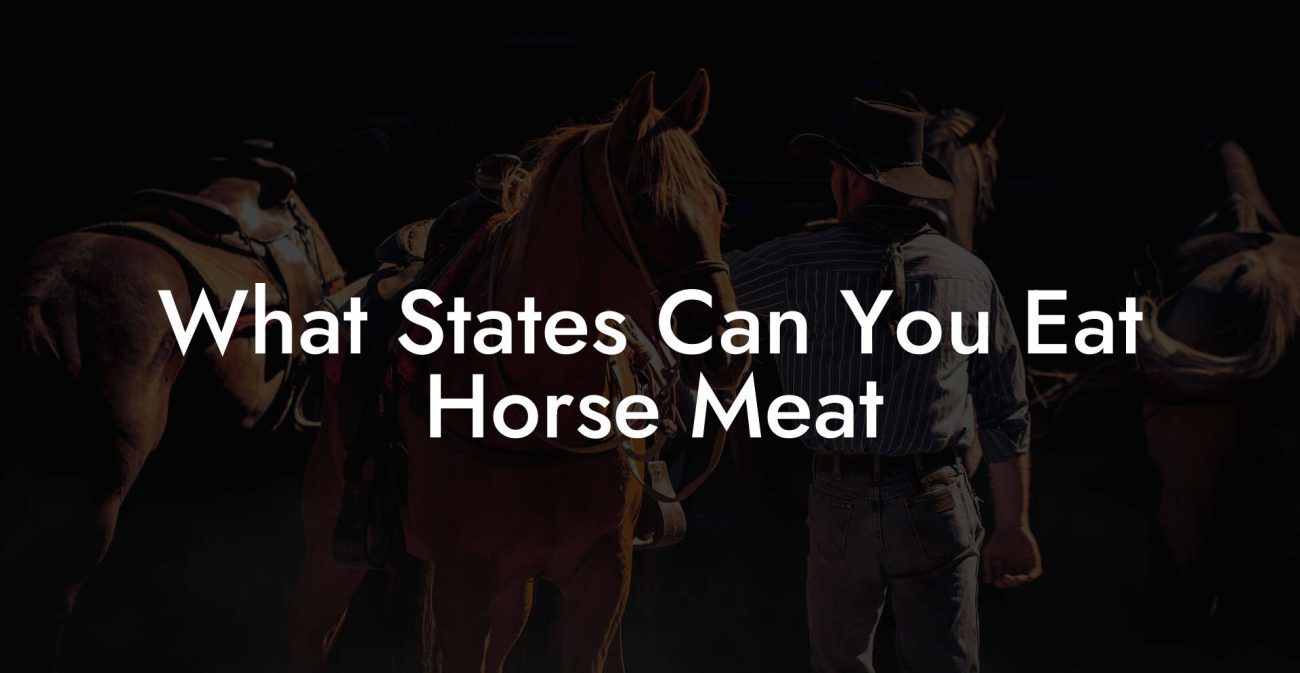Who knew that spending time with horses could be as addictive as scrolling through your favorite TikTok feed? In the realm of Equine Studies, caring for these majestic creatures goes way beyond brushing and feeding, they're practically your four-legged besties who demand a mix of scientific savvy, hands-on know-how, and a dash of millennial charm. Whether you’re a Gen-Z trotter or a millennial mane enthusiast, buckle up: you’re about to gallop into a world of equine wellness, cutting-edge care tips, and a vibrant community that speaks fluent horse care.
Quick Links to Useful Sections
- What Are Equine Studies?
- The Foundations of Equine Anatomy and Health
- Understanding the Equine Body
- Equine Physiology 101
- Essential Horse Care Tips for the Modern Enthusiast
- Daily Grooming: More Than a Beauty Routine
- Stable Management: Creating a Haven for Your Horse
- Exercise and Enrichment Activities
- Nutritional Essentials: Feeding Your Equine Friend Right
- Forage, Hay, and the Grass Factor
- Supplements and Vitamins: The Perfect Boost
- Hydration and Electrolytes
- Training and Behavioral Insights: The Art of Horsemanship
- Understanding Equine Behavior
- Innovative Training Techniques
- Building Trust: The Heart of Horsemanship
- Preventative Healthcare and Veterinary Innovations
- Routine Veterinary Check-Ups
- Vaccinations, Parasite Control, and Dental Care
- Cutting-Edge Treatments and Rehabilitation
- Innovative Technologies in Equine Care
- Wearable Tech and Health Monitoring
- Smart Stables and Environmental Controls
- Data Analysis and Mobile Apps
- Environmental Stewardship and Sustainable Equine Practices
- Sustainable Stable Design
- Eco-Friendly Grooming and Cleaning Practices
- Resources and Community Support: Your Next Steps
- Online Forums and Social Media Groups
- Workshops, Webinars, and Conferences
- Local Equine Associations and Veterinary Clinics
- Your Journey to Empowered Equine Care
- Equine Studies FAQs: Your Questions Answered
What Are Equine Studies?
Equine Studies is a dynamic field that combines traditional horsemanship with modern science, technology, and innovative care strategies. It’s not just about riding and riding; it’s about understanding the biology, behavior, nutrition, and environment that help horses thrive. In today’s fast-paced digital age, this area of study has embraced everything from sustainable stable design to wearable tech that monitors a horse’s health in real time.
This holistic approach transforms the conventional idea of horse care into an engaging, interdisciplinary practice. Whether you’re a student exploring veterinary sciences, an equine enthusiast, or a professional trainer striving to upgrade your skills, Equine Studies serves as your comprehensive playbook to master the art and science of horse care.
By blending academic research, practical applications, and community wisdom, Equine Studies opens up endless possibilities, from understanding the intricacies of equine anatomy to harnessing the latest digital innovations in horse technology. In a nutshell, it’s where passion meets precision, and every trot, canter, and gallop provides a lesson in both biology and life.
The Foundations of Equine Anatomy and Health
Start by diving headfirst into the marvels of equine anatomy, a subject that’s as fascinating as it is essential. Horses are marvels of evolution, blessed with a finely tuned muscular and skeletal structure designed for speed, endurance, and power. Understanding equine anatomy not only sharpens your ability to care for them but also helps in early detection of common health issues.
Understanding the Equine Body
Horses are built to run, jump, and perform, which means that every muscle, bone, and ligament plays a critical role. The equine musculoskeletal system is a marvel: long, resilient limbs, a flexible back, and a powerful hind end make up an engineering feat perfected by nature. Key anatomical features like the splint bones, cannon bones, and the intricate network of tendons and ligaments are vital to their performance.
Equine studies often emphasize the importance of understanding these systems to prevent and treat injuries. From common conditions such as tendonitis and joint inflammation to more complex issues like laminitis and colic, a thorough grounding in anatomy is invaluable. The combination of veterinary insights and modern diagnostic tools ensures that every horse gets the best care possible.
Equine Physiology 101
Equine physiology delves into how a horse’s body operates on a cellular and systemic level. This includes metabolism, cardiovascular function, and respiratory efficiency, each critical for maintaining peak performance. For instance, the equine digestive system is uniquely designed to extract maximum nutrition from high-fiber diets, while also being particularly sensitive to sudden dietary changes. Understanding these physiological processes is key to crafting effective nutrition plans and managing overall health.
Modern Equine Studies even intersects with technology, using wearable sensors and monitoring devices to track a horse’s vital signs during training. This data-driven approach not only helps in tailoring individualized care but also plays a pivotal role in research, pushing the boundaries of equine sports medicine.
By knowing how each part of a horse’s body works, and what can go wrong, you’re better equipped to provide proactive care. Whether you're managing a pasture or preparing a champion racehorse for competition, this knowledge is your foundation for effective equine health management.
Essential Horse Care Tips for the Modern Enthusiast
If you thought horse care was as simple as throwing some hay in a bucket, think again. Today’s equine caretakers need to juggle a variety of tasks that range from routine grooming to advanced health monitoring. Let’s break down some of the essential tips every horse lover should have in their stable toolkit.
Daily Grooming: More Than a Beauty Routine
Grooming isn’t just about aesthetics, it’s a vital part of monitoring your horse’s health. Regular grooming sessions give you the chance to inspect your horse for cuts, rashes, or unusual lumps. Plus, a calm grooming session can be a bonding experience that establishes trust and a strong human-horse connection.
Modern grooming techniques incorporate eco-friendly products and smart tools. For example, there are brushes designed to reduce static, combs that prevent hair tangles, and even digital apps that track grooming schedules. Remember, happy hair equals a happy horse!
Stable Management: Creating a Haven for Your Horse
The stables are your horse’s home, and just like with any home, comfort and safety are paramount. From ensuring proper ventilation and temperature control to maintaining spotless living areas, stable management requires a routine that covers daily cleaning, bedding replacement, and periodic deep cleaning.
But it doesn’t stop there. Modern stable management can include smart sensors to monitor temperature and humidity, automated feeding systems, and even apps that remind you when it’s time to schedule a deep clean. The goal is to create an environment that reduces stress and promotes overall well-being.
Exercise and Enrichment Activities
Physical activity is essential for a horse’s health, just as it is for us. Incorporating regular exercise routines, whether it’s a morning round-up in the paddock or structured training sessions, helps keep muscles strong and joints flexible. And let’s not forget mental stimulation, a bored horse can be as problematic as a bored teenager.
Innovative equine studies have shown that varied exercise routines that mix structured training with playful enrichment activities can reduce anxiety and improve overall performance. Think of it as combining your workout playlist with a scenic trail run, horses love diversity!
Nutritional Essentials: Feeding Your Equine Friend Right
Just like us, horses need a balanced diet to fuel their day-to-day adventures. Nutritional science in equine studies is a deep field that covers everything from the optimal mix of forage to the benefits of supplements, ensuring that your horse is as healthy as they are happy.
Forage, Hay, and the Grass Factor
The backbone of any horse’s diet is forage. High-quality hay, fresh pasture, and legumes are staples that support digestive health and overall energy levels. Knowing when and how much to feed your horse involves a blend of observation and understanding nutritional science.
Advances in equine nutrition advise that the quality of hay and pasture is as important as the quantity. Nutrient profiling, soil testing, and rotational grazing are all modern practices that ensure your horse is grazing on a balanced, chemical-free diet.
Supplements and Vitamins: The Perfect Boost
Depending on the horse’s age, activity level, and health status, supplements can play an important role. Supplements like omega-3 fatty acids, probiotics, and joint support formulas have become popular among millennial horse enthusiasts who are keen on integrating wellness trends into their care routines.
However, the key is balance. Over-supplementation can be as detrimental as a poor diet, so work with a veterinarian or equine nutritionist to tailor a plan that suits your horse’s unique needs.
Hydration and Electrolytes
Hydration is another pillar of equine health. A horse’s digestive system and muscle functions rely on access to clean, fresh water. In intensive training routines or high-temperature environments, supplementing water with electrolytes can help maintain optimal performance and recovery.
Modern apps and smart water sensors can even alert you when your horse’s water intake falls below recommended levels, ensuring that you’re always one step ahead.
Training and Behavioral Insights: The Art of Horsemanship
Gone are the days when training a horse meant relying solely on age-old techniques passed down from generation to generation. Today’s horsemanship marries traditional methods with modern behavioral science, creating training sessions that are both effective and fun.
Understanding Equine Behavior
Horses are highly social and intelligent animals, with a robust communication system that includes body language, vocalizations, and subtle cues. By learning to ‘read’ these signals, you can better understand your horse’s needs, moods, and stress levels.
Modern equine studies emphasize the importance of positive reinforcement, rather than outdated punitive methods. Training protocols now integrate reward-based systems that are both ethical and more effective, making the process enjoyable for both horse and handler.
Innovative Training Techniques
Technology now plays a pivotal role in training. Virtual reality simulations, wearable performance trackers, and digital training logs allow trainers to fine-tune exercises, monitor progress, and instantly adjust techniques if something isn’t working. These innovations not only boost performance but also help prevent injuries by ensuring that the horse’s posture and mechanics are correct.
Whether you’re training a competitive equine athlete or nurturing a young horse into a well-mannered companion, these modern techniques provide a fresh twist on age-old wisdom. They encourage a supportive, empathetic approach that prioritizes the animal’s physical and emotional well-being.
Building Trust: The Heart of Horsemanship
At its core, effective training is about building a relationship based on trust and respect. Spend quality time with your horse both inside and outside of training sessions. Use gentle cues, spend time in grooming, and, yes, even throw in a treat or two. The stronger your bond, the more receptive your horse will be to learning and obedience.
Remember, every horse is unique. What works for one might not work for another, so embrace the journey of trial and error with humor and patience. After all, a true bond between human and horse is a win-win for everyone involved.
Preventative Healthcare and Veterinary Innovations
A proactive approach to healthcare is vital in Equine Studies. Just as we schedule routine doctor visits, horses benefit from regular veterinary check-ups and preventative care routines. Advances in equine medicine have led to early diagnostic tools, minimally invasive procedures, and personalized treatment plans that keep our equine friends in top form.
Routine Veterinary Check-Ups
Annual and semi-annual veterinary visits aren’t just for athletes, they’re crucial for monitoring the overall well-being of all horses. Routine evaluations, blood tests, dental check-ups, and imaging studies help identify issues before they escalate into serious problems. Early intervention is key in preventing chronic conditions such as arthritis, laminitis, or metabolic syndrome.
Increasingly, veterinarians are collaborating with equine scientists to integrate statistical insights and emerging research into everyday care practices. This collaboration ensures that the latest medical advances are quickly adopted in equine healthcare routines.
Vaccinations, Parasite Control, and Dental Care
Preventative measures are not only good practice, they’re essential for long-term health. Regular vaccinations shield horses from infectious diseases, while strategic parasite control plans ensure that your horse remains unburdened by internal and external pests. Additionally, routine dental care helps prevent discomfort and issues related to chewing, which in turn positively impacts overall nutrition.
The latest dental techniques in equine medicine include digital X-rays and specialized dental floating procedures, ensuring that dental health is maintained without the stress often associated with traditional methods.
Cutting-Edge Treatments and Rehabilitation
In recent years, equine rehabilitation has seen a surge in innovative treatments such as regenerative therapies, stem cell applications, and advanced physiotherapy techniques. These methods pave the way for faster recovery and improved overall performance, whether recovering from an injury or simply maintaining peak physical health.
With advances in imaging, biomechanics, and wearable technology, veterinarians can now pinpoint issues with exceptional precision, a crucial component in crafting personalized rehabilitation plans. This data-driven approach not only enhances recovery times but also spearheads a new era of preventative orthopedic care.
Innovative Technologies in Equine Care
Technology has galloped into every aspect of our lives, and horse care is no exception. The fusion of digital advancement with equine studies has given birth to smart stables, wearable devices, and innovative data analysis, all aimed at pushing the boundaries of traditional care.
Wearable Tech and Health Monitoring
Imagine strapping a fitness tracker on your horse, sounds like something straight out of a sci-fi movie, right? Today, wearable technology for horses monitors heart rate, stride length, and even stress levels in real time. These devices enable trainers and veterinarians to catch early signs of discomfort or overexertion, thereby refining training regimens and preventing injuries.
With these smart devices, every gallop becomes data, making it easier to update care plans and maximize performance. It’s like having a personal coach who never sleeps!
Smart Stables and Environmental Controls
The modern stable is no longer just a barn, it’s a high-tech habitat. Smart sensors can regulate temperature, humidity, and lighting to create the perfect environment for your horse. From automated feeding systems to digital surveillance that ensures round-the-clock safety, these innovations revolutionize stable management.
For the tech-savvy equine enthusiast, integrating IoT (Internet of Things) into your stable routine is a game changer. You can remotely monitor environmental conditions, adjust settings in real time, and receive alerts when something’s amiss. This fusion of technology with tradition creates a secure and nurturing environment that caters to every need.
Data Analysis and Mobile Apps
Gone are the days of handwritten logs and guesswork. Today’s equine caretakers have access to a wealth of digital resources, including mobile apps that track exercise routines, diet, and overall health trends. These apps can even forecast potential issues based on historical data, allowing for proactive intervention.
Whether you’re managing a single horse or an entire stable, leveraging these digital tools can streamline your day-to-day tasks and elevate your overall approach to horse care. The data you collect can be shared with your vet or fellow trainers, fostering a community of informed, interactive horse care enthusiasts.
Environmental Stewardship and Sustainable Equine Practices
In today’s eco-conscious world, sustainable practices aren’t just preferred, they’re required. The realm of Equine Studies has embraced environmental stewardship with open arms, and horse care is no exception. From eco-friendly grooming products to green stable designs, sustainability is at the heart of modern equine care.
Sustainable Stable Design
The trend towards sustainable stabling involves utilizing renewable materials, optimizing natural light, and incorporating energy-efficient systems. Many modern stables are designed with rainwater harvesting systems, solar panels, and natural ventilation units that not only reduce the carbon footprint but also create a healthier environment for the horses.
By integrating traditional stable management with modern sustainable practices, caretakers can create a peaceful environment that supports both horse and planet.
Eco-Friendly Grooming and Cleaning Practices
Just as the horses deserve the best care, so does the environment. Eco-friendly grooming products made from natural ingredients are replacing harsh chemicals. Environmentally responsible cleaning practices in stables ensure that water runoff and chemical residues do not harm local ecosystems.
Embracing these sustainable practices not only benefits the planet but also reinforces a commitment to the long-term health of your equine companions. It’s a win-win scenario for Mother Nature and your favorite four-legged pal.
Resources and Community Support: Your Next Steps
No journey in Equine Studies should be a solo ride. There’s a vibrant community of experts, enthusiasts, and innovators who are eager to share their insights and support you along the way. Whether you’re in a rural barn or an urban stable, these resources are your ticket to staying informed and connected.
Online Forums and Social Media Groups
Digital communities on platforms like Instagram, Reddit, and Facebook have become treasure troves of equine knowledge. From troubleshooting stubborn behavioral issues to sharing the latest breakthroughs in equine nutrition, these groups provide real-time advice and inspirational success stories.
Engaging in online forums is a great way to learn from seasoned practitioners and even trade cool horse care hacks that you can implement in your own stable. The exchange of ideas is as dynamic as the horses themselves!
Workshops, Webinars, and Conferences
For those who crave in-depth, hands-on learning, numerous workshops and webinars are available week-round. These events, often led by leading veterinarians, nutritionists, and equine biomechanists, provide a mix of theoretical knowledge and practical demonstrations. It’s the perfect setting to ask questions, build networks, and discover new trends that can elevate your care routine.
Attending these events is not only educational but also a unique platform to meet like-minded equine enthusiasts who share your passion for modern horse care.
Local Equine Associations and Veterinary Clinics
Don’t overlook local resources! Many areas have equine associations that offer mentorship programs, local clinics, and even volunteer opportunities. These organizations often host events, clinics, and seminars that are invaluable for staying current with the latest in equine research and practices.
Whether you’re looking for a mentor or wanting to support community programs aimed at improving equine welfare, local associations provide a strong network of support and solidarity.
Your Journey to Empowered Equine Care
The world of Equine Studies is as vast and dynamic as a sprawling pasture at sunrise. By embracing a multifaceted approach, from detailed anatomical insights and nutritional expertise to cutting-edge technologies and sustainable practices, you’re not just caring for a horse; you’re nurturing a partnership built on trust, innovation, and genuine passion.
Whether you’re administering a daily grooming session, meticulously planning a stable layout, or integrating the latest wearable tech to monitor your equine athlete’s vitals, every step you take builds on a legacy of excellence in horse care. With every lesson learned, every challenge overcome, you’re becoming part of a modern movement that redefines what it means to be a true horse lover.
Remember, the journey to mastering equine care is ongoing, a thrilling adventure where every day brings new insights, innovative ideas, and the chance to reevaluate what true horsemanship means. Stay curious, stay compassionate, and never be afraid to blend the time-tested wisdom of traditional horsemanship with modern scientific breakthroughs.
As you embark on this journey, know that you’re part of a vibrant community that values sustainability, cutting-edge research, and a balanced approach to both science and art in horse care. Your passion fuels progress, and your dedication to continuous learning is as critical as the latest innovation in equine technology.
Embrace the adventure, explore new ideas, share your stories, and always remember that every ride, whether in the arena or in the research lab, is a step toward empowered, holistic equine care.
Equine Studies FAQs: Your Questions Answered
Here are some frequently asked questions that tap into the core concerns and curiosities of modern equine enthusiasts:
1. What exactly are Equine Studies?
Equine Studies is an interdisciplinary field that combines elements of veterinary science, nutrition, behavior, technology, and sustainable management to create a holistic approach to horse care.
2. How does Equine Studies differ from traditional horsemanship?
Traditional horsemanship primarily focuses on riding and basic care, whereas Equine Studies integrates advanced scientific research, technology, and sustainable practices to address all aspects of a horse’s health and well-being.
3. What role does technology play in modern equine care?
Technology revolutionizes equine care by offering devices such as wearable sensors, smart stables, and data-driven mobile apps that help monitor and enhance a horse’s performance and health.
4. Can I apply these advanced practices if I’m a beginner?
Absolutely. Equine Studies is for everyone, from beginners to seasoned professionals. The key is to start with the basics and gradually incorporate more advanced strategies as you become comfortable.
5. How important is nutrition in maintaining equine health?
Nutrition is crucial. A balanced diet consisting of quality forage, proper supplements, and adequate hydration underpins overall health, performance, and longevity in horses.
6. What are some essential grooming tips for maintaining a horse’s coat and skin?
Regular grooming not only keeps your horse looking sharp but also allows you to monitor its health. Use eco-friendly grooming products and establish a routine that includes brushing, hoof cleaning, and skin inspections.
7. How do sustainable practices influence equine care?
Sustainable practices, from smart stable design to eco-friendly cleaning, help create a healthier environment for horses while promoting long-term environmental stewardship.
8. Are there online communities for equine care enthusiasts?
Yes, platforms like Instagram, Reddit, and Facebook host vibrant groups where enthusiasts share tips, technology insights, and firsthand experiences in modern equine care.
9. What innovations in veterinary care are emerging in Equine Studies?
Emerging innovations include regenerative therapies, wearable health monitors, and data analytics that help customize health plans and speed up recovery for injured horses.
10. How can I get started on my Equine Studies journey?
Start by connecting with local equine associations, following online forums, and attending workshops or webinars. Combine hands-on care with academic research to build a well-rounded understanding.













